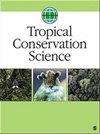Morphoanatomical and Biochemical Changes in Seeds of Bagassa guianensis (Moraceae)
IF 1.6
4区 环境科学与生态学
Q2 BIODIVERSITY CONSERVATION
引用次数: 0
Abstract
Bagassa guianensis Aubl. is a tree of high timber value (Moraceae family) native to the Amazon. In this study, we characterized the morphoanatomical and biochemical properties of Bagassa guianensis seeds at different levels of fruit control based on biometric, morphoanatomical, color and biochemical analyses. Four stages of seed development have been identified in the fruit of Bagassa guianensis. The seeds presented endosperm, being classified as albuminous. Seeds from fruits with 5 GY 4/4 colors and green pigmentation (stage I) presented fully formed embryos. According to PCA (principal component analysis) data, it was found that all stages of seed dominance had a significant effect and highly correlated with the biochemical properties of the seed. Despite the comparatively low biometric values, high levels of Total Soluble Sugars (3.58%), Total Soluble Proteins (2.12%) and Reducing Sugars (1.43%) were observed in seeds at this stage. On the other hand, the content of amino acids (0.87%) and starch (3.30%) was higher at late maturity. The highest amounts of starch were detected from stage II onwards (31.29 mg/g DM), when the seeds reached physiological maturity. Biochemical and morphological information from seeds are relevant for planning conservation, observation and restoration strategies, and this study on the species B. guianensis is essential.桑科植物 Bagassa guianensis 种子的形态解剖学和生物化学变化
Bagassa guianensis Aubl.是一种原产于亚马逊地区的高木材价值树种(桑科)。在这项研究中,我们根据生物计量学、形态解剖学、颜色和生化分析,确定了 Bagassa guianensis 种子在不同果实控制水平下的形态解剖学和生化特性。Bagassa guianensis 果实的种子发育分为四个阶段。种子呈现胚乳,被归类为白蛋白。颜色为 5 GY 4/4 和绿色色素沉着(第一阶段)的果实种子呈现完全形成的胚。根据 PCA(主成分分析)数据,发现种子优势的所有阶段都有显著影响,并与种子的生化特性高度相关。尽管生物计量值相对较低,但在这一阶段的种子中观察到了较高水平的总可溶性糖(3.58%)、总可溶性蛋白质(2.12%)和还原糖(1.43%)。另一方面,晚熟作物的氨基酸(0.87%)和淀粉(3.30%)含量较高。淀粉含量最高的阶段是从第二阶段开始(31.29 毫克/克 DM),此时种子达到生理成熟。种子的生物化学和形态学信息对于规划保护、观察和恢复策略具有重要意义,这项关于 B. guianensis 这一物种的研究非常必要。
本文章由计算机程序翻译,如有差异,请以英文原文为准。
求助全文
约1分钟内获得全文
求助全文
来源期刊

Tropical Conservation Science
BIODIVERSITY CONSERVATION-
CiteScore
3.60
自引率
5.90%
发文量
16
审稿时长
>12 weeks
期刊介绍:
Tropical Conservation Science is a peer-reviewed, open access journal that publishes original research papers and state-of-the-art reviews of broad interest to the field of conservation of tropical forests and of other tropical ecosystems.
 求助内容:
求助内容: 应助结果提醒方式:
应助结果提醒方式:


